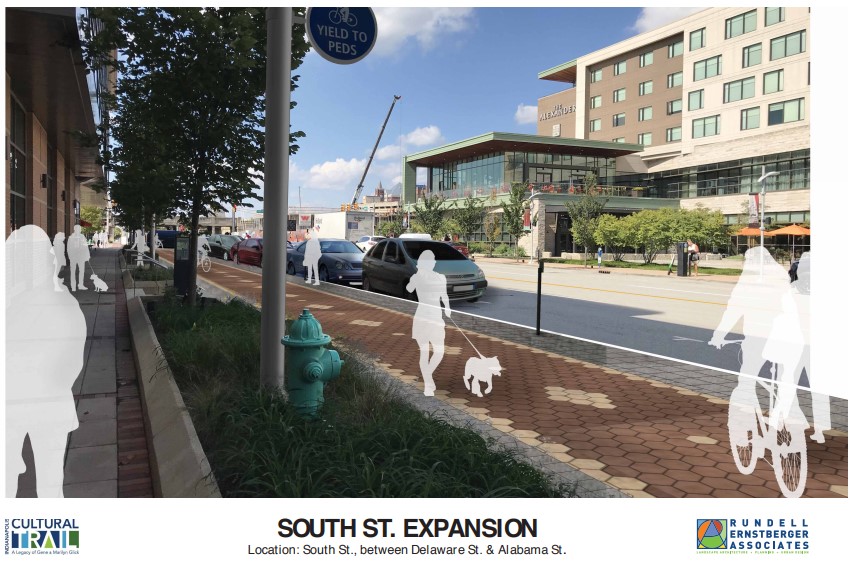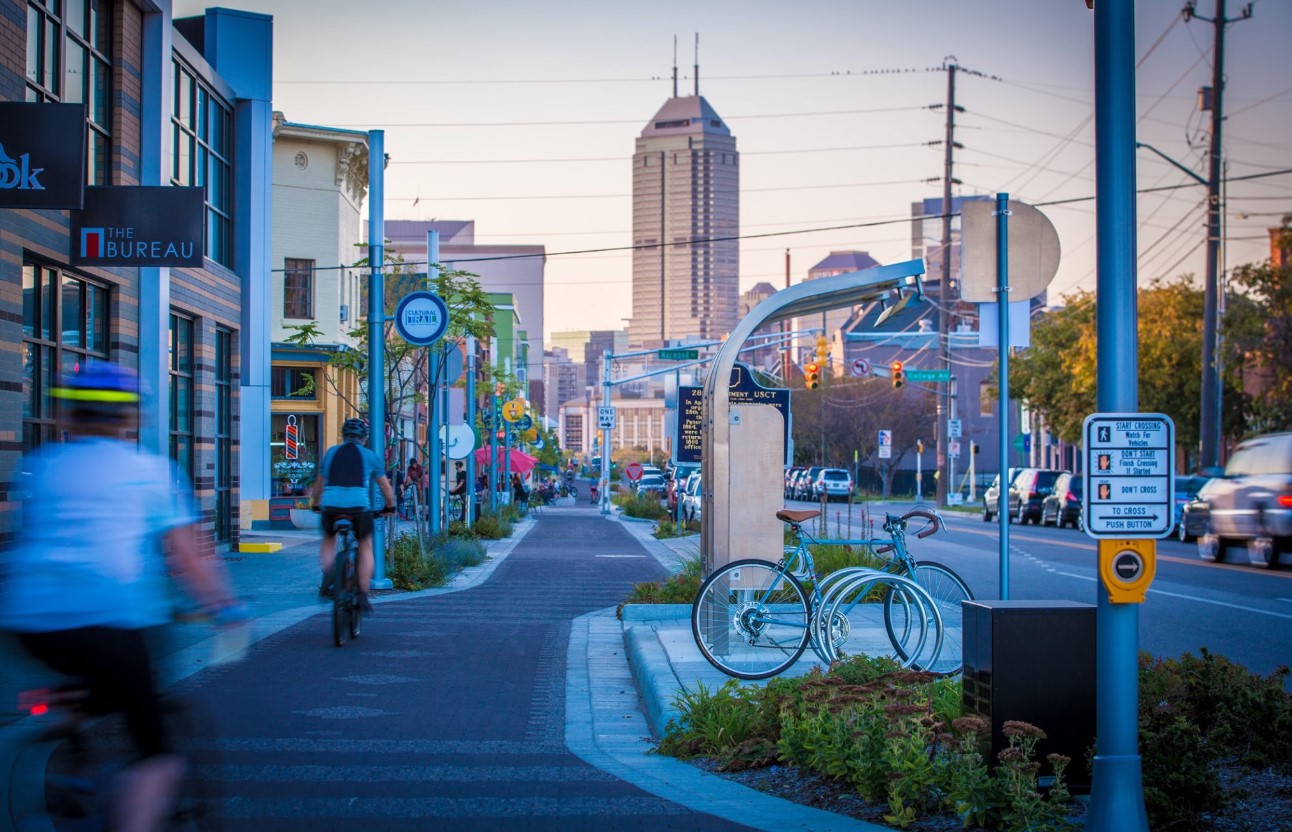
The South Street expansion will improve access in a stretch of downtown Indianapolis that includes Lucas Oil Stadium, the Indiana Convention Center, and a growing residential hub anchored by CityWay.
Source: Credit to Indianapolis Cultural Trail, Inc.
| Project Name | Indianapolis Cultural Trail |
|---|---|
| Location | Indianapolis, Indiana |
| Project Sponsor / Borrower | Indianapolis Cultural Trail, Inc. |
| Program Areas |
|
| Value Capture Techniques | Private Contribution & Tax Increment Financing |
| Mode | Pedestrian / Bicycle / Light Rail Transit |
| Description | The Indianapolis Cultural Trail, an eight-mile trail that opened in 2013, connects the cultural districts of Massachusetts Avenue, Fountain Square, the Canal & White River State Park, Indiana Avenue, the Wholesale District, and Broad Ripple. Sitting on over 8,000 cubic yards of topsoil, the trail provides access from downtown to Broad Ripple Village and Carmel. It includes more than 80 bike racks and 9 public art projects. It was designed to enhance the art community in Indianapolis and connects every significant arts, cultural, heritage, sports, and entertainment venue. The trail also includes gardens that are maintained according to various ecologically informed principles to provide downtown Indianapolis with green space, wildlife habitats, and protected pedestrian-focused corridors. The garden beds cover a total of five acres, include thousands of perennial plants and hundreds of shrubs, plus add 525 trees to the downtown landscape. Along the trail, events include food tours, walking and biking tours, and egg hunts. Through its “Everybody Rides” program, the Indiana Pacers Bikeshare program offers residents and visitors access to gold Pacers Bikeshare bikes. Its “Adaptive Bicycle” program provides bikes for people who are not comfortable with or have mobility challenges riding a traditional two-wheeled bicycle. The trail was constructed with financial support from community donations and U.S. Department of Transportation funding through a Transportation Investment Generating Economic Recovery (TIGER) grant. It is managed by Indianapolis Cultural Trail, Inc., which works to maintain and continue the trail’s growth and improvement. Current expansion projects include adding new stretches to the trail’s internationally recognized linear park and urban bike and pedestrian path. The two-mile expansions will further connect neighborhoods and will contain botanical gardens and a public art program. They will also close gaps on the northwest and south sides of the trail. The South Street expansion will span from Capitol Avenue to New Jersey Street, while the Indiana Avenue expansion will continue in front of the Madam Walker Legacy Center and up to 10th Street. The Indianapolis Cultural Trail expansion projects are expected to be completed by 2022. |
| Cost | Initial Trail: $63 million |
| Funding Sources | Initial Trail
Expansion
|
| Project Delivery / Contract Method | Design-Bid-Build |
| Private Partner |
|
| Project Advisors / Consultants |
|
| Lenders | N/A |
| Duration / Status | The initial Trail raised $4 million from 2003-2004 for preliminary design studies and concepts. After further private and public contributions, the Trail’s ground-breaking took place in 2007 and in May 2013, the construction was completed, and the official grand opening occurred. The expansion’s design process is scheduled for completion in 2020, with construction ending in 2022. |
| Financial Status / Financial Performance | Indianapolis philanthropists Eugene and Marilyn Glick committed $15M as a lead gift for the initial Trail, and the U.S. Department of Transportation awarded the Trail with a $20.5 million grant through its TIGER grant. Lilly Endowment, Inc., City of Indianapolis, and the Anthem Foundation have committed a combined $26 million toward the Trail expansion. Construction will only begin after all funding estimated for the project is collected. |
| Innovations |
|
| Related Links / Articles |
|
| Contacts | Sarah Frey Rebecca Knoop |

There are over five acres of perennial plants, shrubs, and over 500 trees along the Indianapolis Cultural Trail.
Sources: Credit to Indianapolis Cultural Trail, Inc.